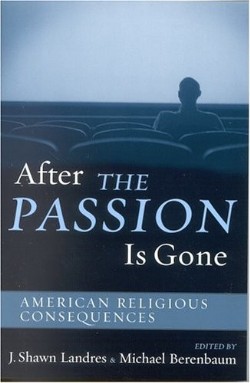Manners and Customs
Showing the single result
-
After The Passion Is Gone
$83.33Add to cartIntroduction
J. Shawn Landres And Michael Berenbaum
Part One: The Context Of The PassionIntroduction To Part One
Almost A Culture War: The Making Of The Passion Controversy
Mark Silk (Trinity College)
Passionate Blogging: Interfaith Controversy And The Internet
William J. Cork (Catholic Diocese Of Galveston-Houston)
Living In The World, But Not Of The World: Understanding Evangelical Support For The Passion Of The Christ
Leslie Smith (UCSB)
The Passion Paradox: Signposts On The Road Toward Mormon Protestantization
Eric Samuelsen (BYU)
Is It Finished? The Passion Of The Christ And The Fault Lines In American Christianity
Julie Ingersoll (University Of North Florida)
Part Two: The Passion In ContextIntroduction To Part Two
The Journey Of The Passion Play From Medieval Piety To Contemporary Spirituality
Karen Jo Torjesen (Claremont Graduate University)
The Gibson Code?
Lorenzo Albacete (St. Joseph Seminary, Yonkers)
“But Is It Art?”: A Prelude To Criticism Of Mel Gibson’s The Passion Of The Christ
Robert A. Faggen (Claremont McKenna College)
Antisemitism Without Erasure: Sacred Texts And Their Contemporary Interpretations
Gary L. Gilbert (Claremont McKenna College)
Theologizing The Death Of Jesus, Gibson’s The Passion, And Christian Identity
Jeffrey S. Siker (Loyola Marymount University)
Manly Pain And Motherly Love: Mel Gibson’s Big Picture
David Morgan (Valparaiso University)
Imago Christi: Aesthetic And Theological Issues In Jesus Films By Pasolini, Scorsese, And Gibson
Lloyd Baugh, SJ (Pontifical Gregorian University, Rome)
Part Three: Jews And Christians: Reframing The DialogueIntroduction To Part Three
Theological Bulimia: Christianity And Its Dejudaization
Susannah Heschel (Dartmouth College)
A March Of Passion, Or, How I Came To Terms With A Film I Wasn’t Supposed To Like
Stephen R. Haynes (Rhodes College)
The Exposed Fault Line
Richard L. Rubenstein (University Of Bridgeport)
Crucifying Jesus: Antisemitism And The Passion Story
Stephen T. Davis (Claremont McKenna College)
Five Introspective Challenges
David M. Elcott (American Jewish Committee)
No Crucifixion = No Holocaust: Post-Holocaust Reflections On The Passion Of The Christ
John K. Roth (Claremont McKenna College)
The Passionate Encounter: The Ethics Of Affirming Your Faith In A Multi-Religious World
Elliot N. Dorff (University Of Judaism)
Reframing Difference: Evangelicals, Scripture, AnAdditional Info
Mel Gibson’s The Passion of the Christ topped box office charts and changed the American religious conversation. The controversies it raised remain unsettled. In After The Passion Is Gone: American Religious Consequences, leading scholars of religion and theology ask what Gibson’s film and the resulting controversy reveal about Christians, Jews, and the possibilities of interreligious dialogue in the United States. Landres and Berenbaum’s collection moves beyond questions of whether or not the film was faithful to the gospels, too violent, or antisemitic and explores why the debate focused on these issues but not others. The public discussion of The Passion shed light on a wide range of American attitudes–evangelical Protestant, mainline Protestant, Roman Catholic, and Jewish–about media and faith, politics and history, Jesus and Judaism, fundamentalism and victimhood. After The Passion Is Gone takes a unique view of vital points in Christian-Jewish relations and contemporary American religion

